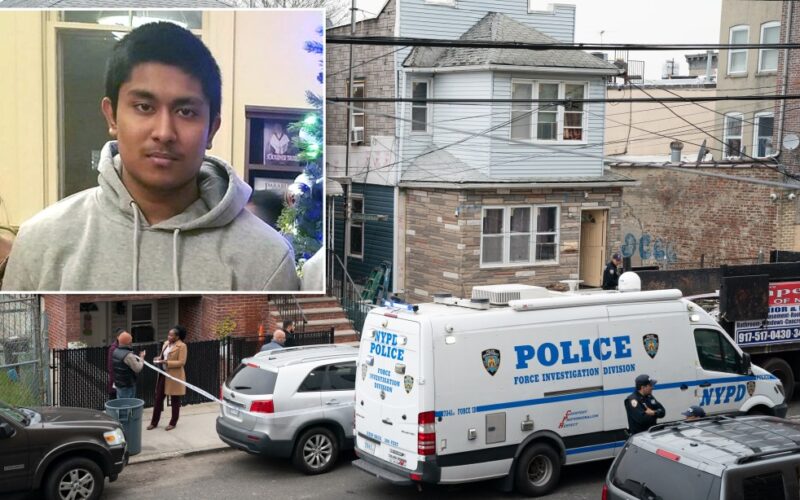A city police oversight board overruled the findings of its own investigators in substantiating misconduct charges against two officers who shot and killed 19-year-old Win Rozario as he moved toward them holding a pair of scissors in the midst of a mental health episode in Queens in March 2024, city records confirmed Friday.
The records show that Civilian Complaint Review Board investigators concluded Officers Matthew Cianfranco and Salvatore Alongi who shot and killed Rozario in Ozone Park on March 27, 2024 acted within NYPD guidelines on all 16 allegations in the complaint.
But following a public meeting Wednesday, the board instead concluded the evidence upheld eight charges alleging the cops used excessive force and abused their authority during the two-minute encounter in Rozario’s apartment, the records show. The findings were forwarded to the board’s Administrative Prosecution Unit.
The board found five of the remaining eight allegations to be within guidelines and in three, ruled a finding could not be made, the records show.
“CCRB’s board members didn’t even pretend to give this case a fair and impartial hearing,” said Patrick Hendry, the president of the Police Benevolent Association which represents the two officers. “They disregarded the facts, the law and even the recommendations of their own investigators, who found these police officers’ actions to be within NYPD guidelines.
Hendry noted how unusual it is that the CCRB sets aside its investigators findings. Between August 2023 and August 2025, CCRB investigators found cops within guidelines in 6,599 allegations, and the board only disagreed and substantiated the allegations in five instances.
“This board is tainted by too many members who take their marching orders from extreme anti-police activists, and the board’s leadership simply doesn’t have the courage to do the right thing,” Hendry added. “We will continue to expose CCRB board members’ outrageous bias as we defend these police officers, who were forced to make a split-second decision under incredibly difficult circumstances.”
Barry Williams for New York Daily News
Win Rozario’s mother, Notan Eva Costa, speaks along side her son, Utsho Rozario, left, at a press conference outside City Hall in May 2024. (Barry Williams for New York Daily News)
According to CCRB processes, investigators review all documents, video and conduct the interviews before presenting their findings to the board. The board then meets behind closed doors to decide whether to accept the findings.
“CCRB investigations are thorough, impartial, and deliberative,” CCRB spokesman Dakota Gardner said. “The Board takes its responsibility to New Yorkers seriously, rigorously reviewing all the gathered evidence and weighing all factors in making its determination. All agency staff work in support of the Board’s deliberations, which are the formal disciplinary recommendation by the CCRB.”
A spokeswoman for the NYPD said only the case remains under investigation. Typically, the department’s Force Investigation Division conducts probes into police involved shootings. An investigation by the state Attorney General is also continuing.
The first word of the board’s findings came via a press release from the Justice Committee, an advocacy group. A Board official notified the family of the decision on Thursday, according to Yul-San Liem, a spokesperson for the group. The board referred unspecified other allegations the NYPD to investigate, the Justice Committee said in the statement.

The advocacy group did not disclose the difference in conclusions between the board’s findings and those of the investigators.
“CCRB’s decision gives us some relief in this moment that they understand that Win’s life mattered and that Alongi and Cianfrocco are dangerous. That means something to us,” said Rozario’s mother Notan Eva Costa. “We thank the CCRB for moving forward on disciplining Alongi and Cianfrocco.”
Added Loyda Colon, executive director of the Justice Committee, “Firing cops for unjustly killing a teenager who was safe in his home until they arrived should not take this long, and we’re at an early step in the process. We’re demanding the NYPD serve the discipline charges immediately, instead of their usual tactic of stalling to shield the cops.”
During the board’s public meeting Wednesday, roughly a dozen supporters of the Rozario family, including Gwen Carr, Eric Garner’s mother, used their allotted four minutes to go over in painstaking detail why they believed officers violated NYPD rules, emphasizing Rozario’s young age.
“Everyone has mental illness in their family somewhere and this could happen to us,” Carr said.
In response, interim chair Dr. Mohammad Khalid said the board takes its work seriously. “I assure you we are all reading these cases, we will try our best,” he said. “I am very very sorry. what happened there, people should not lose their life.”
On March 27, 2024, Rozario, in the midst of a mental health episode, called 911, bringing Cianfranco and Alongi to his door. The entire two-minute encounter was caught on body camera video.

At some point in the encounter, Rozario picked up a pair of yellow scissors and moved toward the officers. They used a taser and then Cianfrocco first once and then four more times as Rozario’s mother tried to intervene to protect her son.
A lawsuit filed by the family in June alleges despite the fact that Rozario was holding the scissors, the officers were far enough away not to be in any danger. It claims if they had attempted to calm the situation, Rozario would be alive.
The lawsuit claims the officers violated a string of NYPD regulations on handling encounters with the mentally ill.
In response to the suit, Hendry of the PBA said at the time the officers were trying to “minimize the risks to everyone in that room and were forced to make split-second decisions based on those risks.”
Originally Published:








